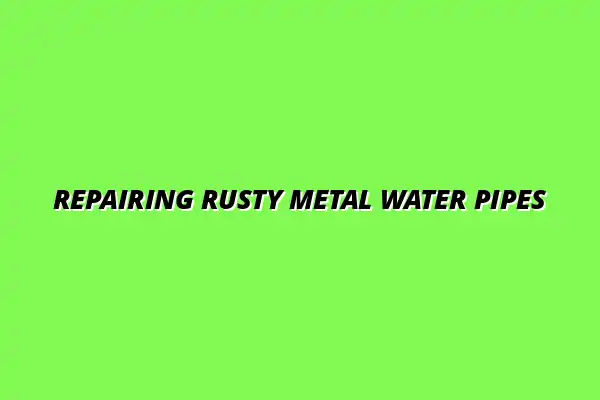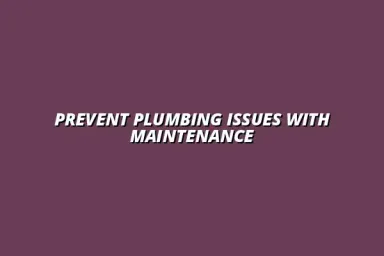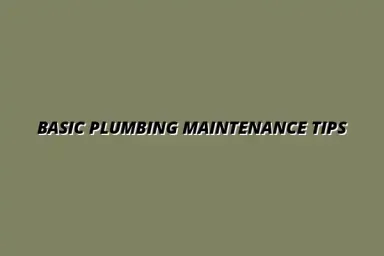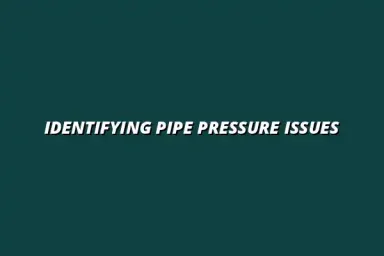Understanding Rust in Old Metal Water Pipes
Rust can become a serious issue in metal water pipes, especially if they are old and have been exposed to various elements over time. Understanding what causes rust and how it affects your water system is vital for maintaining safe and clean water. Let’s dive into the factors that lead to rust in metal pipes!
What Causes Rust in Metal Water Pipes?
Rust forms primarily due to a combination of metal, oxygen, and moisture. When these elements interact, they create iron oxide, commonly known as rust. This process can accelerate in environments where moisture is prevalent, making it essential to understand how water and humidity contribute to this issue.
The Role of Moisture in Rust Formation
Moisture is the primary catalyst for rusting. When water leaks or condensation forms on the pipes, it creates an ideal setting for rust to develop. In areas where pipes are consistently moist, rust can spread rapidly, leading to significant damage over time.
In addition to direct moisture exposure, poor drainage and high humidity levels can further exacerbate rust formation. It's crucial to keep an eye on the moisture levels in your home to prevent long-term damage to your water pipes. Regular water pipe cleaning can also help mitigate this.
Impact of Ageing Infrastructure on Water Quality
As metal pipes age, they become more susceptible to rust. Older pipes often have a thinner protective layer, which means they are less effective at preventing rust from forming. This deterioration can lead to a decrease in water quality, as rust particles may mix with drinking water. Understanding aging pipe maintenance is crucial for homeowners.
Furthermore, ageing infrastructure can also lead to leaks and decreased water pressure. Regular inspections are key to ensuring your pipes remain in good condition and maintain safe water quality!
Signs of Rust in Your Water Pipes
Recognizing the signs of rust is crucial for taking action before the damage becomes extensive. Rust can manifest in various ways, and being vigilant can save you from costly repairs later on. Let's explore some of the common indicators!
Visible Rust and Corrosion Indicators
One of the most noticeable signs of rust is the presence of reddish-brown stains on your water fixtures or around the pipes themselves. Additional indicators may include:
- Flaking or peeling paint on the pipes
- Visible corrosion or pitting on metal surfaces
- Stains in the sink or on dishes after washing
If you observe any of these signs, it’s a good idea to investigate further. Addressing rust early on can help mitigate serious issues down the line! A leaky kitchen sink, for example, can be a sign of underlying pipe problems. Learn how to repair a leaky kitchen sink.
Effects on Water Pressure and Quality
Rust does not just affect the pipes visually; it can also impact water pressure and quality. A buildup of rust inside the pipes can restrict water flow, leading to lower pressure. This can make simple tasks like showering or washing the dishes frustrating.
Moreover, if rust particles enter your drinking water, they can cause health concerns and an unpleasant taste. Regular checks can help ensure your water remains clean and your pipes function effectively!
Preventing Future Rust Build-Up in Metal Water Pipes
Preventing rust in metal water pipes is essential for maintaining clean and healthy water flow. By taking steps to address potential issues before they escalate, you can prolong the lifespan of your pipes and ensure the quality of your water supply. Regular maintenance and protective measures are key components in this process!
In this section, we'll explore hands-on practices such as inspections and the use of protective coatings, helping you to keep rust at bay and your plumbing system in optimal condition.
Regular Maintenance Practices
Routine maintenance is crucial for detecting early signs of rust and ensuring that your pipes remain in good shape. One of the best ways to maintain your water pipes is through scheduled inspections. This allows you to identify any issues before they become serious, saving you time and money in the long run.
Here are some essential maintenance practices to adopt for your metal pipes:
- Conduct regular visual inspections for signs of rust, leaks, or discoloration.
- Flush your pipes periodically to remove sediment build-up.
- Check for proper drainage around the exterior of your home.
- Monitor your water pressure for any sudden changes.
Importance of Routine Pipe Inspections
Regular inspections allow you to catch rust and corrosion early. By being proactive, you can prevent costly repairs down the line. Ideally, aim to inspect your pipes at least once a year!
During these inspections, look for:
- Visible rust spots
- Leaks or damp spots on walls
- Flaking or peeling paint in areas around pipes
How Water Quality Affects Pipe Longevity
The quality of your water plays a significant role in the condition of your metal pipes. Hard water, which contains high levels of minerals, can accelerate rust and corrosion. Consider testing your water quality to determine its composition! Understanding the causes of bursting water pipes can help prevent costly repairs.
To improve water quality and protect your pipes, consider the following:
- Install a water softener to reduce mineral buildup.
- Use filters to remove impurities and contaminants.
- Flush your pipes regularly to keep water flowing smoothly.
Using Protective Coatings for Metal Pipes
One effective way to combat rust is by applying protective coatings to your metal pipes. These coatings create a barrier that shields the pipes from moisture and corrosive elements. This step can significantly enhance the lifespan of your plumbing system!
There are a variety of coatings available on the market, each with distinct advantages. It’s important to choose one that suits your specific needs.
Overview of Anti-Corrosive Coatings
Anti-corrosive coatings come in different forms, including paints and sprays. They can be applied directly to the surface of the pipes. Some popular options include:
- Epoxy coatings for strong adhesion and durability.
- PVC coatings that offer flexibility and resistance to chemicals.
- Polyurethane coatings for UV protection and color retention.
Benefits of Installing a Water Softener
Installing a water softener can be a game-changer for your plumbing system! Soft water reduces mineral buildup, which can lead to rust and corrosion. By treating your water, you can create a healthier environment for your pipes. If you're tackling a plumbing project yourself, check out our guide on how to replace a toilet flapper.
Some key benefits of having a water softener include:
- Longer lifespan for your pipes and appliances.
- Improved water quality and taste.
- Less soap scum and mineral deposits on fixtures.
Addressing Common Questions about Rust in Water Pipes
Rust in water pipes can raise several important questions. Understanding the implications and addressing concerns can help you take action to protect your home and family. Let’s dive into some common queries about rust and how to tackle them effectively!
In this section, we will cover health concerns related to rust, signs that your pipes may need replacement, and what actions to take for a better water supply.
Is Rust in Water Pipes a Health Concern?
When it comes to rust in water pipes, many people worry about potential health risks. While rust itself is not usually harmful in small amounts, it can lead to issues with water quality. Knowing what you’re dealing with can help you make informed decisions!
Water quality standards are in place to ensure that drinking water is safe. Here’s what you should consider:
- Test your water for contaminants regularly.
- Monitor the levels of rust in your water.
- Consult local regulations regarding water quality standards.
Understanding Water Quality Standards
Water quality standards help to protect public health by setting limits on contaminants in drinking water. Be sure to familiarize yourself with these standards and check your water regularly. This will ensure that you continue to receive safe, clean water!
In addition, consider contacting your local water authority to understand more about the water quality in your area. For serious issues, such as repairing a leaking water heater pipe, you'll need professional help.
What to Do if Rust Contaminates Your Water Supply
If you notice rust or discoloration in your water, it’s important to take action quickly! Start by flushing your pipes and running the water for a few minutes. If the problem persists, don’t hesitate to reach out to a plumbing professional for assistance. If you need a plumber in Birmingham, consider contacting a plumber in Billesley, Birmingham.
Here are some steps to consider if rust contaminates your water supply:
- Stop using the affected water for drinking or cooking until resolved.
- Request a water quality test to identify contaminants.
- Consult with a plumbing expert about potential solutions.
How Can I Tell if My Pipes Need Replacement?
Knowing when to replace your pipes can save you a lot of trouble in the long run. If you're noticing persistent issues like leaks or rust, it may be time to consider a replacement. Recognizing the signs early can make a big difference!
Keep an eye out for these key signs indicating immediate action is necessary:
- Frequent leaks or water pooling around pipes.
- Visible rust or corrosion on the surface.
- Significantly reduced water pressure.
Key Signs Indicating Immediate Action is Necessary
Immediate action is crucial when you see severe rust or damage. If your pipes are showing multiple signs of distress, it's time to call a professional! Regular monitoring can help you catch these problems early and respond accordingly.
Long-Term Risks of Ignoring Pipe Damage
Ignoring rust and damage in your pipes can lead to expensive repairs and inconveniences in the future. Over time, untreated issues can escalate, resulting in leaks and even structural damage to your home. It’s better to be proactive than reactive!
To avoid long-term risks, make sure to:
- Conduct routine inspections of your plumbing system.
- Address any signs of rust or corrosion immediately.
- Stay informed about your water quality and pipe condition.
Summarizing Key Takeaways and Action Steps
Maintaining your water pipes is essential for ensuring clean water and preventing rust buildup. By following the strategies outlined in this section, you can safeguard your plumbing and enjoy long-term benefits. Establishing preventive measures is a smart investment in your home!
Don't forget the importance of routine maintenance and monitoring your water quality. These actions can go a long way in extending the life of your pipes.
Recognizing the Importance of Pipe Care
Taking care of your pipes pays off! Regular evaluations and maintenance can lead to significant cost savings and peace of mind. A well-maintained plumbing system ensures that your home remains safe and comfortable.
Remember to prioritize the following:
- Schedule regular inspections with a plumbing professional.
- Maintain clear communication with your water provider.
- Stay informed about the condition of your pipes.
Long-Term Benefits of Maintaining Water Pipes
Maintaining your water pipes not only ensures good water quality but also adds value to your home. You’ll experience fewer emergencies and less stress, making for a happier home environment! Investing in your plumbing now can lead to long-term savings.
Encouragement to Schedule Regular Inspections
Take action today! Schedule regular inspections and make pipe care a priority. With the right attention and effort, you can keep your plumbing system running smoothly for years to come.
Final Thoughts on Managing Rust in Water Pipes
Managing rust in your water pipes is a vital responsibility that requires ongoing attention. By evaluating your options based on pipe condition, you can make informed decisions about repairs or replacements. Whether you choose to go the DIY route or hire a professional, knowledge is your best ally!
Stay proactive and tackle rust issues before they spiral out of control. It’s all about ensuring safety and quality for you and your family!
Evaluating Your Options Based on Pipe Condition
When assessing your pipes, consider factors like age, material, and overall condition. Understanding these elements can help you determine if repairs or replacements are necessary. Don’t hesitate to consult experts when in doubt!
Resources for Further Reading and Assistance
For additional information, consider exploring resources like plumbing guides, local plumbing services, or community forums. Staying informed can empower you to take the best steps for maintaining your water pipes effectively!

 Kiran Almasi
Kiran Almasi

